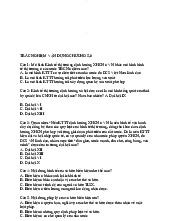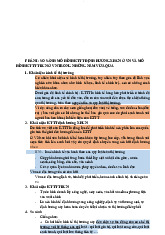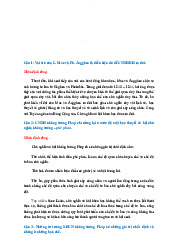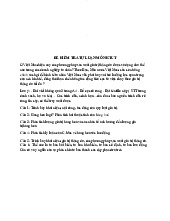




Preview text:
CÂU HỎI ÔN TẬP KTCTQT
Chapter 1: INTRODUCTION TO INTERNATIONAL POLITICAL ECONOMY
Chapter 2: THEORIES OF INTERNATIONAL POLITICAL ECONOMY Chapter 3: INTERNATIONAL TRADE
Chapter 4: MULTINATIONAL CORPORATIONS
Chapter 5: INTERNATIONAL MONETARY AND FINANCIAL SYSTEM Chapter 6: INTERNATIONAL DEVELOPMENT
Chapter 7: GLOBALIZATION AND REGIONAL INTEGRATION
Chapter 8: CURRENT ISSUES IN THE INTERNATIONAL POLITICAL ECONOMY
Multinational companies (MNCs)
In your opinion, does modernization theory or dependency theory explain better for the underdevelopment of the global south? Why?
Modernization Theory
- Reasons for underdevelopment are internal deficiencies
- Global South must:
- Create conditions for efficient production, free enterprise, and free trade
- Attract investment capital from the Global North
- Pass through stages of development and reach “take off”
- Historical conditions that allowed the North to do this in the 19th century do not exist now
Dependency Theory
- Reasons for underdevelopment are external
- Capitalist world economy is based on a division of labor between the industrialized core and underdeveloped periphery
- Global North keeps Global South poor through:
- Terms of trade and finance
- Cultural penetration
- Exploitation by multinational corporations
- Dualism—rural impoverished sector and urban modernizing sector
 Has trouble explaining the NICs
Has trouble explaining the NICs
In your opinion, which of the 4 theories (realism, max, construct and liberalism) have the best explanatory and predictive power in IPE in general? Why?
In my opinion, Liberalism is the best explanatory and predictor of problems in the international political economy. Because the theoretical content they give is related to important subjects, about the role of the state and especially the relations related to states. I agree with the view of liberalism because the countries of the world are fully capable of harmonizing interests, win-win games, and can cooperate with each other for peace, mutual development and mutual benefit. Especially, through international institutions. They should care about absolute benefits, not compare with countries in terms of similar interests.
I agree with the point of view, International organizations are neutral and they have an important role. Liberalism holds that international organizations make decisions based on an analysis of the benefits and harms to countries and they are not influenced or pressured by any one country.
eg: United Nations (UN), COVID-19 Vaccines Global Access (COVAX)
What does IPE study?
International political economy (IPE) studies how politics shape developments in the global economy and how the global economy shapes politics. It focuses most heavily on the enduring political battle between the winners and losers from global economic exchange. Although all societies benefit from participation in the global economy, these gains are not distributed evenly among individuals. Global economic exchange raises the income of some people and lowers the income of others. The distributive consequences of global economic exchange generate political competition in national and international arenas. The winners seek deeper links with the global economy in order to extend and consolidate their gains, whereas the losers try to erect barriers between the global and national economies in order to minimize or even reverse their losses.
Two approaches in IPE studies:
Explanatory
- Attempt to answer “why” questions
- To explain a specific economic policy choice made by a government or to explain a pattern of choices within a group of governments
Evaluation
- Welfare consequences
- Distributional consequences
Do you agree with the liberalist theory that international organizations are neural? Why or Why not?
Liberalism is the most influential position in IPE. Most international organizations are founded on the tenets of liberalism. Liberalism holds that international organizations make decisions based on an analysis of the benefits and harms to countries and they are not influenced or pressured by any one country. So I agree with the point of view, international organizations are neutral.
Neutral international organizations have an important role:
ex: United Nations (UN) is an intergovernmental organization with the task of maintaining international peace and security, promoting friendly relations among nations, implementing international cooperation, and serving as a center for coordination of international efforts. economy and common goals, or COVID-19 Vaccines Global Access (COVAX)
Option 2:
International organizations are not neutral
In terms of finance: International organizations established by major countries, paying the most money, leaders, management, and the United Nations Security Council are all major decision-makers behind. pressure behind
How do MNC look like from a nationalist perspective?
- The expansion of of Multinational Corporations (MNCs) is important for the home countries’ security
- The overseas expansion of multinational corporations was to maintain home country’s dominant world economic position in other expanding economies
- MNCs have also been viewed as serving the interests of the home country’s balance payment
- MNC has also been regarded as a mechanism to spread the home country’s ideology
- MNCs have also been regarded as a tool of diplomacy
What is the liberalism view on international investment? (Quan điểm của chủ nghĩa tự do về đầu tư quốc tế là gì?) (Chapter 4)
Liberalists believe that a firm’s behaviour is determined almost entirely by market signals and that, therefore, the nationality of the firm is of slight importance
- The nature of international economic relations is essentially harmonious
- Positive-sum game.
- Trade and economic intercourse are a source of peaceful relations among nations
- MNC represents the transcendence of politics in the interests of world peace and development.
→ Politics: In the interest of world efficiency and welfareà the nation-state’s control over economic affairs should be transferred to the MNC and eventually to the international institutions
In your opinion, should country make alliance or trust allies? Why or why not? (Theo bạn, quốc gia nên liên minh hay tin cậy đồng minh? Tại sao hoặc tại sao không?) (Chapter 1)
Country should not trust allies because:
- States can never be certain of the intentions of other states (i.e. all states are security seeking)
- Politics is seen as zero-sum
- Seek flexible alliances to maintain a balance of power
- States should be prepared for war in order to preserve peace
How does marxism view RTA (Chủ nghĩa mac xem RTA như thế nào)
RTA have important distributional effects: some states benefiting at the expense of others. The distribution of benefits in RTAs reflects the asymmetries of power, wealth, and technology among members states. MNCs and transnational capital are the main beneficiaries of RTAs, and the working class and poorest states are the main losers.
What are the 2 main questions in IPE (Chapter 1)
the 2 main questions in IPE are:
- First, how does politics shape societal decisions about how to allocate available resources?
- Second, what are the consequences of these decisions?
What are the main advantages and criticism of globalization (Những ưu điểm chính và những chỉ trích của toàn cầu hóa là gì)
the main advantages of globalization:
- Transfer of Technology
- Better Services
- Standardization of Living
- Development of Infrastructure
- Foreign Exchange Reserves
- Economic Growth
- Affordable Products
- Contribution to World GDP Growth Rate
- Extensions of Market
the criticism of globalization: the environment (Environmental Loots) ; human rights and worker rights (Increasing of the Unemployment rate, Trade Imbalance); and
inequality and poverty, particularly in developing countries (Growing Inequality and poverty)
(Disadvantages: Growing Inequality, Increasing of the Unemployment rate, Trade Imbalance, Environmental Loots) (nếu cần)
- What are the role of WTO in development? what are the reason challenges facing (Vai trò của WTO đối với sự phát triển? lý do thách thức phải đối mặt là gì) (chép hết, k bỏ gì)
The role of WTO in development:
The WTO is a hub of an international political system under which governments negotiate, enforce and revise rules to govern their trade policies
- Providing a forum for trade negotiations
- Administering the trade agreements that governments conclude
- Providing a mechanism to resolve trade disputes
the reason challenges facing: Three substantial changes in recent years:
- The emergence of developing countries as a powerful bloc within the WTO
- The emergence of non-governmental organizations as a powerful force outside the organization
- The growth of Regional trade agreements (a.k.a regionalism)
why do the Doha round negotiation take so long? why is the RTA thriving? (Tại sao đàm phán vòng Doha kéo dài quá lâu? tại sao RTA lại phát triển mạnh?)
- the Doha round negotiation take so long because:
- the complexity of the issues at the center of negotiations. Current negotiations deal with more sensitive behind-the-border measures, and with areas such as agriculture and services that are often subject to strong protectionist forces.
- the growing diversity of interests among WTO member governments. With the increased size and diversity of participants (161 members), the WTO’s dependence on consensus decision-making makes it very difficult to achieve agreement on a broad-ranging multilateral trade negotiations.
- the RTA thriving because of the difficulties in reaching a WTO Doha Round agreement and RTA offer a more discriminatory way to organize world trade.




